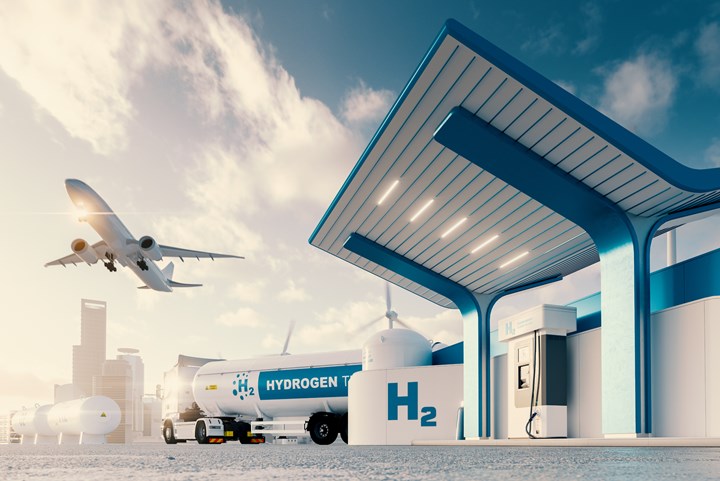FFI, Universal Hydrogen join forces to decarbonize aviation
Identification, development of green hydrogen customer demand in the aviation industry, logistic hub production and delivery of FFI’s green hydrogen supply lay the foundations for zero-emissions flight.
Share

Photo Credit: Getty Images
Fortescue Future Industries (FFI, Perth, Australia) and Universal Hydrogen (Los Angeles, Calif., U.S.) have joined forces to enable the aviation industry to decarbonize through zero-emissions green hydrogen. The renewable resource only generates water when burned, and is a more weight-efficient energy carrier with nearly four times more energy per unit of mass than traditional jet fuel. The announcement follows the heels of FFI’s recognition at the climate change conference COP26 in Glasglow, U.K. back in November.
Under the signed memorandum of understanding (MOU), FFI and Universal Hydrogen have agreed to:
- Negotiate a global offtake arrangement whereby FFI will supply green hydrogen to Universal Hydrogen to power regional and other aviation sectors until 2035;
- Conduct a scoping study to develop green hydrogen production and logistics hubs in Iceland, New Zealand and Southeast Queensland; and
- Evaluate future green hydrogen demand in the aviation industry on a region-by-region basis to identify and promote green hydrogen adoption and uptake.
“Universal Hydrogen has an ambitious plan to help fight climate change, with a goal of making hydrogen-powered commercial flights a reality — and FFI is committed to enabling that target,” says Dr. Andrew Forrest AO, FFI Chairman. “Our collaboration lays the foundations for a zero-emissions aviation industry in the near-term future.
“Currently, aviation accounts for 2.5% of global carbon dioxide emissions, and emissions have doubled since the 1980s. Electrifying our planes will only go so far and will only be appropriate for smaller aircraft, due to current limitations around battery technologies. Green hydrogen, in contrast, is a practical solution we can use right now.”
Universal Hydrogen, in which FFI is also an early investor, is building a flexible, scalable and capital-light solution to hydrogen logistics for aviation through its modular Type IV hydrogen capsule technology. The tanks can be filled with gaseous and liquid hydrogen and are delivered from the point of production directly to the aircraft using existing freight networks and cargo handling equipment.
“The demand for green hydrogen in the aviation industry is expected to grow exponentially as new climate targets are set globally,” adds Julie Shuttleworth AM, FFI CEO. “This deal reinforces that green hydrogen has the potential to be a powerful fuel for a range of difficult-to-decarbonize industries, including aviation.”
According to Universal Hydrogen CEO, Paul Eremenko, the collaboration will also ensure that there is an adequate global supply of green hydrogen to fuel regional aviation in the 2020s and support the entry into service of a hydrogen single-aisle airplane in the 2030s. “Through the investment of companies like FFI, we expect green hydrogen to be at cost parity with jet fuel on an equivalent energy basis by the mid-2020s, and to be significantly cheaper in the years that follow,” says Eremenko.
FFI will take the lead on green hydrogen production activities and supply to the identified markets or green H2 Hubs, and Universal Hydrogen will take the lead on delivery logistics to airports and on-airport fuel services.
Related Content
-
NCC reaches milestone in composite cryogenic hydrogen program
The National Composites Centre is testing composite cryogenic storage tank demonstrators with increasing complexity, to support U.K. transition to the hydrogen economy.
-
Honda begins production of 2025 CR-V e:FCEV with Type 4 hydrogen tanks in U.S.
Model includes new technologies produced at Performance Manufacturing Center (PMC) in Marysville, Ohio, which is part of Honda hydrogen business strategy that includes Class 8 trucks.
-
Cryo-compressed hydrogen, the best solution for storage and refueling stations?
Cryomotive’s CRYOGAS solution claims the highest storage density, lowest refueling cost and widest operating range without H2 losses while using one-fifth the carbon fiber required in compressed gas tanks.
















